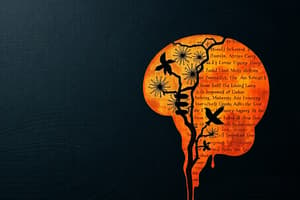Podcast
Questions and Answers
What does the term 'philosophy' derive from?
What does the term 'philosophy' derive from?
- Love and wisdom (correct)
- Reason and understanding
- Love and knowledge
- Knowledge and power
Which principle states that a thing cannot both be and not be at the same time?
Which principle states that a thing cannot both be and not be at the same time?
- Principle of Identity
- Principle of Sufficient Reason
- Principle of Non-Contradiction (correct)
- Principle of Excluded Middle
Which of the following branches of philosophy investigates the nature, sources, and validity of knowledge?
Which of the following branches of philosophy investigates the nature, sources, and validity of knowledge?
- Ethics
- Metaphysics
- Epistemology (correct)
- Logic
What does political philosophy primarily address?
What does political philosophy primarily address?
Which philosopher is known for first employing the logical method?
Which philosopher is known for first employing the logical method?
Flashcards are hidden until you start studying
Study Notes
Philosophy Overview
- Originates from Greek words "philo" (to love) and "sophia" (wisdom).
- Philosophical inquiry encompasses a broad range of topics concerning existence, knowledge, values, and reason.
Characteristics of Philosophy
- Science: Philosophy is classified as a science, systematically exploring fundamental questions.
- Natural Light of Reason: Utilizes rational thought and logic in its analysis and deductions.
- Studying All Things: Engages in a comprehensive examination of various subjects and phenomena.
- First Cause or Highest Principle: Investigates foundational principles guiding existence and reality.
Fundamental Principles
- Principle of Identity: Affirms that every entity is identical to itself ("everything is what it is").
- Principle of Non-Contradiction: Asserts that contradictory statements about the same thing cannot be true simultaneously.
- Principle of Excluded Middle: States that for any proposition, it must either be true or false; there is no middle ground.
- Principle of Sufficient Reason: Claims that there must be adequate explanations for why things exist.
Branches of Philosophy
- Ethics: Examines moral values and human conduct, evaluating right from wrong.
- Aesthetics: Studies beauty, art, and taste, exploring what is considered aesthetically pleasing.
- Logic: Serves as a framework for constructing valid arguments and ensuring sound reasoning; pioneered by Aristotle.
- Political Philosophy: Investigates the relationship between individuals and society, focusing on governance and rights.
- Epistemology: Explores the nature, sources, and limits of knowledge, asking crucial questions about belief and truth.
- Metaphysics: Examines the fundamental nature of reality, including questions about existence and the nature of non-physical entities; notably influenced by Plato.
Key Philosophers
- Aristotle: First to apply logical methodologies to philosophy, shaping the field of logic.
- Plato: Significant contributor to metaphysical philosophy, emphasizing the distinction between reality and sensory perception.
Studying That Suits You
Use AI to generate personalized quizzes and flashcards to suit your learning preferences.



